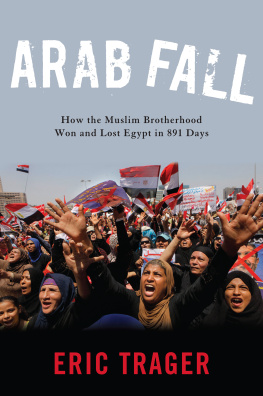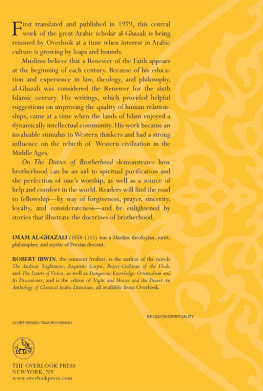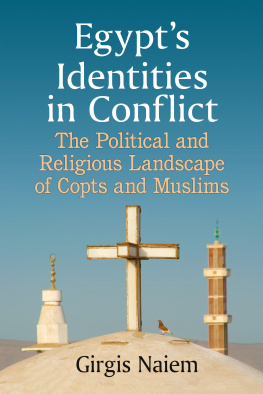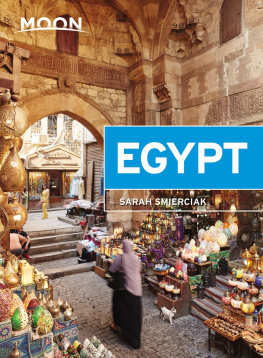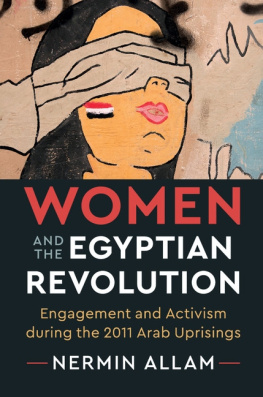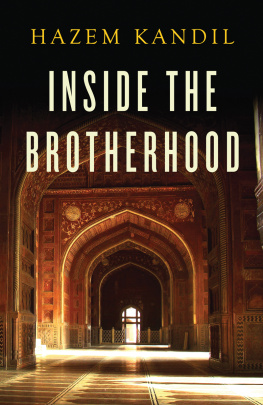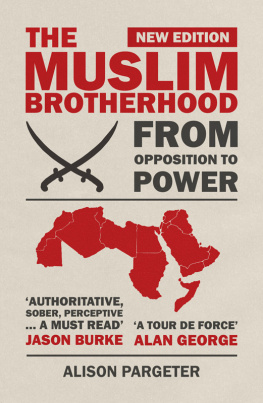Acknowledgments
Why dont you write a book on the Muslim Brotherhood? Call it The Rise and Fall of the Muslim Brotherhood. When Rob Satloff suggested this to me in the spring of 2013, I was a bit hesitant. Mohamed Morsi was clearly losing support and control, yet I wasnt convinced that he would be toppled anytime soon. But, as usual, Rob was way ahead of the curve, and I want to thank him for his tremendous mentorship throughout my five years as a fellow at the Washington Institute for Near East Policy.
I would also like to thank my Washington Institute colleagues for their encouragement, advice, and friendship throughout the process of writing this book: David Schenker, Patrick Clawson, Andrew Tabler, Simon Henderson, Mike Singh, Dennis Ross, Neri Zilber, Aaron Zelin, Marc Sievers, Ghaith al-Omari, Lori Plotkin Boghardt, Anna Borshchevskaya, Soner Cagaptay, Mohammed Dajani, Mike Eisenstadt, Sarah Feuer, Jim Jeffrey, Mehdi Khalaji, Matt Levitt, David Makovsky, Ehud Yaari, Jacob Olidort, Kate Bauer, Nadav Pollak, David Pollock, Vish Sakthivel, Margaret Weiss Tam, Jeff White, Lauren Emerson, Rebecca Erdman, Dan Heckelman, Laura Hannah, Jeff Rubin, Gina Vailes, Mary Kalbach Horan, Scott Rogers, George Lopez, Brittany Parker, Ian Byrne, Alison Percich, Jeanne Epstein, Jacqui Schein, and Judy Cole.
I also want to thank the Nathan and Esther K. Wagner Family Foundation for its generous support of my work. I was honored to be named the Washington Institutes Esther K. Wagner Fellow in July 2013. Many thanks to Nathan Wagner, Susan Wagner, Michael Lippitz, Joyce Croft, Linda Wagner Weiner, and their families for cultivating young scholars such as myself.
I owe a special thanks to my outstanding research assistant Marina Shalabi for her tireless work throughout the drafting of this book. Marina transcribed many hours of Brotherhood videos, translated key Brotherhood statements, sifted through hundreds of pages of Brotherhood tracts, and offered vital feedback throughout the drafting process. I would also like to thank my former research assistant Gilad Wenig, who is now studying at Cambridge University, for providing timely feedback on my first draft and serving as a constant sounding board for my research ideas. Many thanks as well to the many research assistants and interns who contributed to the years of research that went into this book: Katie Kiraly, Gavi Barnhard, Adam Rasgon, Noam Raydan, Heba Dafashy, Adam Sadick, Haisam Hassanein, Nour Chaaban, Oula Alrifai Abdulhamid, Erica Wenig, Yara Hattab, James Bowker, Talia Rubin, Noah Bricker, Leah Schulz, Timna Medovoy, Samy Saad, Eliot Calhoun, Cooper Klose, Grace Abuhamad, and Sonia Hinson.
I also owe a special thanks to Maged Atef. I first met Maged in February 2013 when I needed a fixer to assist my research in rural Egypt, and I have worked with him on almost every research trip that I have taken since then. In addition to being outstandingly resourceful and analytical, he is a wonderful friend. I would also like to thank my two prior interpreters in Egypt, Mohamed Hemeda and Ahmad Khader.
Many thanks as well to my friends and colleagues in Egypt, including those who have moved elsewhere, for making my research trips so enjoyable: Nancy Youssef, Amina Ismail, Wendy Steavenson, Jon Argaman, Mohamed Abdelbaky, Mahmoud Salem, The Big Pharaoh, Mahmoud Ibrahem, Ahmed Samih, Amr Bargisi, Emma Deputy, Bonnie Wei, Hany Nasr, Yasmin Amin, and Maryam Ishani. I would also like to thank Steven Cook and Samuel Tadros, two Washington-based colleagues, for their insights and encouragement over the years. And special thanks to Donald Jacobs of Georgetown University Press, who guided me through the process and shepherded this project to publication. I would also like to thank Kathryn Owens, Don McKeon, and Terri Rothman for their outstanding editorial work.
Parts of this book emerged from my doctoral research, and Id like to thank my committee at the University of Pennsylvanias Political Science DepartmentBob Vitalis, Brendan OLeary, and Tulia Falletifor guiding my general interest in Egyptian politics to a full-bodied dissertation. I would also like to thank the department and the Christopher H. Brown Center for International Politics, both of which provided vital fellowship support for the earlier stages of my fieldwork, and the American Research Center in Egypt, which administered the grant for the second half of my dissertation research in early 2011. Many thanks as well to (now former) department chairs Ed Mansfield and Avery Goldstein for making Penn such a warm community for learning and growing and to my classmate Chris Russell for being a great friend, colleague, and study partner.
Most of all, I am extremely grateful for my familys unyielding love and support throughout the many years of research that went into this book. My parents Cara and Mike, sister Rachel, and grandfather Papa Sy urged me to follow my fascination with Egyptian politics long before the Arab Spring made it fashionable. I want to thank my father as well for suggesting the title of this book. I am also blessed to have wonderful in-laws, Rhonda and Jeff, who have been extremely supportive.
The true saint of this project, however, is my wife and best friend, Alyssa. For her tremendous love, support, and patience during the many months I was awaywhether in Cairo doing research or in my office writing it upthis book is dedicated to her. It is also dedicated to our two sons: our eldest, Max, arrived in February 2015 just as I was completing the first draft, and our youngest, Theodore, arrived in August 2016 just before this book went to press.
To my best friendmy wife, Alyssaand to our two sons, Max and Theodore
Abbreviations
AR | In Arabic |
BDP | Building and Development Party |
CSF | Central Security Forces |
EGIS | Egyptian General Intelligence Service |
ESDP | Egyptian Social Democratic Party |
FJP | Freedom and Justice Party |
IAEA | International Atomic Energy Agency |

